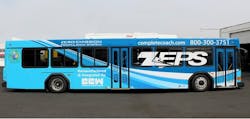VVTA Begins Testing Electric-Powered Transit Bus
Victor Valley Transit Authority begins testing its first electric-powered transit bus Friday, March 18. Using a demonstration bus provided by Complete Coach Works, the effort is part of the agency’s quest to meet proposed California Air Resource Board standards for zero-emissions transit fleets. The 10-day period will enable the agency to test and demonstrate the technology on 16 of its 34 routes, which provide connections from San Bernardino, through Barstow, and to Fort Irwin for its commuter service.
“As an agency entrusted to serve its community, we are looking deep into zero-emissions technology,” said VVTA Chair Barb Stanton, “The environment is always a concern. Yet, it is wise for us to fully understand the fiscal and operational impact of converting to an all-electric transit fleet. It’s great to see VVTA analysts taking the lead.”
The California Air Resource Board (CARB) proposal would require 15 percent of transit bus purchases to meet zero-emissions standards by 2018. The goal proposed for 2040 would require transit agencies to transition to an all zero-emissions bus fleet.
The demonstration bus is an example of the Complete Coach Works remanufacturing process, which retrofits buses that were once powered by fossil fuels with the electric-powered Zero-Emission Propulsion System (ZEPS). The refurbished Gillig 40-foot low floor transit bus VVTA will use features Complete Coach Works blue graphics and VVTA signage.
The electric-powered demonstration bus features 201 horsepower and up to a 150-mile range, while the average CNG-powered buses it will substitute for boast 230 horsepower and a 500-mile range.
“There are logistical challenges we must overcome to field an all-electric fleet in the High Desert,” said VVTA Director of Maintenance & Facilities, Ron Zirges. “We have steep hills, long distances, hot weather, and enduring traffic patterns to consider. We are looking to see how this technology fits within our system and how we might effectively adapt it to meet the proposed requirements.”
A January 2016 National Renewable Energy Laboratory report on a Foothill Transit battery electric bus demonstration period revealed an average fuel cost of $0.39 per mile for an electric-powered bus versus $0.23 per mile for a CNG-powered bus.
“There are many performance claims about various technologies and such little data to substantiate those claims,” said Zirges, who has taken an active role with a California Transit Association group that discusses CARB requirements and alternative fuel viability. “We are taking a careful look at available data and comparing experiences to find viable solutions.”
Beginning Friday, the electric-powered bus will service NTC Commuter routes 101 and 104. The bus services Barstow routes 1 on Saturday and 3 on Sunday. Next week, the bus services route 45X Monday, route 15 B-V Link and 41 Tuesday, 45 and 52 Wednesday, 48 and 43 Thursday, 51 and 55 Friday, 53 Saturday, and 44 Sunday.
Rides on the Complete Coach Works demonstration bus with the bright blue graphics will be free of charge.
